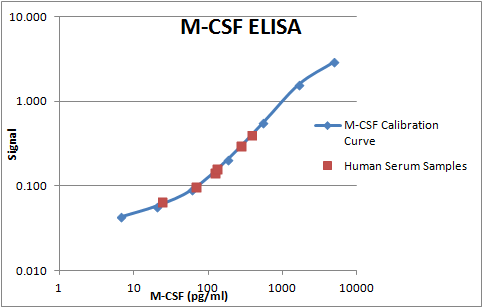Human M-CSF Antibody Summary
Glu33-Ser190
Accession # NP_757350
Applications
Please Note: Optimal dilutions should be determined by each laboratory for each application. General Protocols are available in the Technical Information section on our website.
Scientific Data
 View Larger
View Larger
Cell Proliferation Induced by M‑CSF and Neutralization by Human M‑CSF Antibody. Recombinant Human M-CSF (Catalog # 216-MC) stimulates proliferation in the M-NFS-60 mouse myelogenous leukemia lymphoblast cell line in a dose-dependent manner (orange line). Proliferation elicited by Recombinant Human M-CSF (2.5 ng/mL) is neutralized (green line) by increasing concentrations of Goat Anti-Human M-CSF Antigen Affinity-purified Polyclonal Antibody (Catalog # AF216). The ND50 is typically 0.01-0.03 µg/mL.
Preparation and Storage
- 12 months from date of receipt, -20 to -70 °C as supplied.
- 1 month, 2 to 8 °C under sterile conditions after reconstitution.
- 6 months, -20 to -70 °C under sterile conditions after reconstitution.
Background: M-CSF
M-CSF, also known as CSF-1, is a four-alpha -helical-bundle cytokine that is the primary regulator of macrophage survival, proliferation and differentiation. M-CSF is also essential for the survival and proliferation of osteoclast progenitors. M-CSF also primes and enhances macrophage killing of tumor cells and microorganisms, regulates the release of cytokines and other inflammatory modulators from macrophages, and stimulates pinocytosis. M-CSF increases during pregnancy to support implantation and growth of the decidua and placenta. Sources of M-CSF include fibroblasts, activated macrophages, endometrial secretory epithelium, bone marrow stromal cells and activated endothelial cells. The M-CSF receptor (c-fms) transduces its pleotropic effects and mediates its endocytosis. M-CSF mRNAs of various sizes occur. Full length human M-CSF transcripts encode a 522 amino acid (aa) type I transmembrane (TM) protein with a 464 aa extracellular region, a 21 aa TM domain, and a 37 aa cytoplasmic tail that forms a 140 kDa covalent dimer. Differential processing produces two proteolytically cleaved, secreted dimers. One is an N- and O- glycosylated 86 kDa dimer, while the other is modified by both glycosylation and chondroitin-sulfate proteoglycan (PG) to generate a 200 kDa subunit. Although PG-modified M-CSF can circulate, it may be immobilized by attachment to type V collagen. Shorter transcripts encode M-CSF that lacks cleavage and PG sites and produces an N-glycosylated 68 kDa TM dimer and a slowly produced 44 kDa secreted dimer. Although forms may vary in activity and half-life, all contain the N-terminal 150 aa portion that is necessary and sufficient for interaction with the M-CSF receptor. The first 223 aa of mature human M-CSF shares 88%, 86%, 81% and 74% aa identity with corresponding regions of dog, cow, mouse and rat M-CSF, respectively. Human M-CSF is active in the mouse, but mouse M-CSF is reported to be species-specific.
Product Datasheets
Citations for Human M-CSF Antibody
R&D Systems personnel manually curate a database that contains references using R&D Systems products. The data collected includes not only links to publications in PubMed, but also provides information about sample types, species, and experimental conditions.
7
Citations: Showing 1 - 7
Filter your results:
Filter by:
-
Fucoidan modulates cytokine production and migration of THP-1-derived macrophages via colony-stimulating factor-1
Authors: Peng Li, Huayang Wang, Qianqian Shao, Beihua Kong, Xun Qu
Molecular Medicine Reports
-
Crosstalk between macrophage-derived PGE2 and tumor UHRF1 drives hepatocellular carcinoma progression
Authors: J Zhang, H Zhang, X Ding, J Hu, Y Li, J Zhang, H Wang, S Qi, A Xie, J Shi, M Xiang, Y Bin, G Wang, L Wang, Z Wang
Theranostics, 2022-05-01;12(8):3776-3793.
Species: Human
Sample Types: Cell Lysates, Whole Cells
Applications: Neutralization, Western Blot -
Long non-coding RNA HOMER3-AS1 drives hepatocellular carcinoma progression via modulating the behaviors of both tumor cells and macrophages
Authors: J Pu, W Li, A Wang, Y Zhang, Z Qin, Z Xu, J Wang, Y Lu, Q Tang, H Wei
Cell Death & Disease, 2021-11-23;12(12):1103.
Species: Human
Sample Types: Whole Cells
Applications: Cell Culture -
Tumoral NOX4 recruits M2 tumor-associated macrophages via ROS/PI3K signaling-dependent various cytokine production to promote NSCLC growth
Authors: J Zhang, H Li, Q Wu, Y Chen, Y Deng, Z Yang, L Zhang, B Liu
Redox Biol, 2019-02-06;22(0):101116.
Species: Human
Sample Types: Cell Culture Supernates
Applications: Neutralization -
Fucoidan modulates cytokine production and migration of THP-1-derived macrophages via colony-stimulating factor-1
Authors: Peng Li, Huayang Wang, Qianqian Shao, Beihua Kong, Xun Qu
Molecular Medicine Reports
Species: Human
Sample Types: Whole Cells
Applications: Neutralization -
Pleiotrophin produced by multiple myeloma induces transdifferentiation of monocytes into vascular endothelial cells: a novel mechanism of tumor-induced vasculogenesis.
Authors: Chen H, Campbell RA, Chang Y, Li M, Wang CS, Li J, Sanchez E, Share M, Steinberg J, Berenson A, Shalitin D, Zeng Z, Gui D, Perez-Pinera P, Berenson RJ, Said J, Bonavida B, Deuel TF, Berenson JR
Blood, 2008-12-05;113(9):1992-2002.
Species: Human
Sample Types: Whole Cells
Applications: ICC -
LARRPM restricts lung adenocarcinoma progression and M2 macrophage polarization through epigenetically regulating LINC00240 and CSF1
Authors: Yue Li, Chen Chen, Hai-lin Liu, Zhen-fa Zhang, Chang-li Wang
Cellular & Molecular Biology Letters
FAQs
No product specific FAQs exist for this product, however you may
View all Antibody FAQsReviews for Human M-CSF Antibody
Average Rating: 5 (Based on 2 Reviews)
Have you used Human M-CSF Antibody?
Submit a review and receive an Amazon gift card.
$25/€18/£15/$25CAN/¥75 Yuan/¥2500 Yen for a review with an image
$10/€7/£6/$10 CAD/¥70 Yuan/¥1110 Yen for a review without an image
Filter by:




